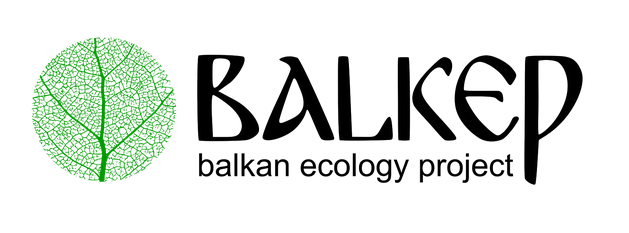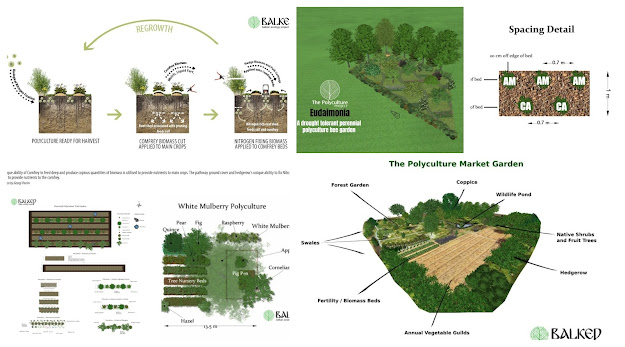Summer has slipped effortlessly into autumn, and although we're still without any rain at all, the nights are getting chilly and what's left of the annual production is now finishing up. Thoughts are turning to autumn planting and nursery work - welcome to The Polyculture Project - Week 26.
Before we look at this week's events, we want to let you know about our 'How to Design and Build A Forest Garden' webinar, now scheduled for Saturday, 28th of November.
The session will be based on this forest garden that Paul recently designed. It will be around 2 hours long and will include and overview of the design, the starting point, why we laid out access, water, drainage, habitat features and planting locations where we did, species selection, technical discussion and a Q&A.
We've been gorging on grapes all week, which are incredibly sweet this year due to the low amount of rainfall. To maintain the plants, we usually water each vine weekly with a couple of large watering cans (around 20L of water). Other than that, the vines require little attention from us during the growing season, except to pluck these fine fruits when ripe and enjoy :) For our essential guide see here. We also offer a range of cultivars from our bionursery, so check out our selection here.
Regenerative Landscape Design - Online Interactive Course
Want to learn how to design, build and manage regenerative landscapes? Join us for our Regenerative Landscape Design - Online Interactive Course from May 1st to Sep 13th, 2023.
We're super excited about running the course and look forward to providing you with the confidence, inspiration, and opportunity to design, build and manage regenerative landscapes, gardens, and farms that produce food and other resources for humans while enhancing biodiversity.

Regenerative Landscape Design Online Course
You can find out all about the course here and right now we have a 20% discount on the full enrollment fees. Just use the promo code RLD2023 in the section of the registration form to receive your discount.
We are looking forward to providing you with this unique online learning experience - as far as we know, the very first of its kind. If you are thinking of reasons why you should do this course and whether this course is suitable for you, take a look here where we lay it all out. Looking forward to it!
We're super excited about running the course and look forward to providing you with the confidence, inspiration, and opportunity to design, build and manage regenerative landscapes, gardens, and farms that produce food and other resources for humans while enhancing biodiversity.
 |
| Regenerative Landscape Design Online Course |
You can find out all about the course here and right now we have a 20% discount on the full enrollment fees. Just use the promo code RLD2023 in the section of the registration form to receive your discount.
We are looking forward to providing you with this unique online learning experience - as far as we know, the very first of its kind. If you are thinking of reasons why you should do this course and whether this course is suitable for you, take a look here where we lay it all out. Looking forward to it!
 |
 |
| Walnut Cultivars Available This Season |
 |
| Plants, Seeds, eBooks, Consultancy, Bulk Fruit and Nut Tree Orders for Permaculture, Polyculture, Forest Gardens and Regenerative Landscapes. |
Regenerative Landscape Design - Online Interactive Course
Want to learn how to design, build and manage regenerative landscapes? Join us for our Regenerative Landscape Design - Online Interactive Course from May 1st to Sep 13th, 2023.
We're super excited about running the course and look forward to providing you with the confidence, inspiration, and opportunity to design, build and manage regenerative landscapes, gardens, and farms that produce food and other resources for humans while enhancing biodiversity.
Regenerative Landscape Design Online Course
You can find out all about the course here and right now we have a 20% discount on the full enrollment fees. Just use the promo code RLD2023 in the section of the registration form to receive your discount.
We are looking forward to providing you with this unique online learning experience - as far as we know, the very first of its kind. If you are thinking of reasons why you should do this course and whether this course is suitable for you, take a look here where we lay it all out. Looking forward to it!
--------------------------------------------------------------------------------------------------------------------------
Support Our Project
If you appreciate the work we are doing you can show your support in several ways.
- Make a purchase of plants or seeds from our Bionursery or Online Store
- Consider joining us for one of our Courses or Online Courses
- Comment, like, and share our content on social media.
- Donate directly via PayPal to balkanecologyproject@gmail.com or via FTX Pay
- Make a purchase of plants or seeds from our Bionursery or Online Store
- Consider joining us for one of our Courses or Online Courses
- Comment, like, and share our content on social media.
- Donate directly via PayPal to balkanecologyproject@gmail.com or via FTX Pay
 |
| You can also register for our online training, services, and products directly here. |


































